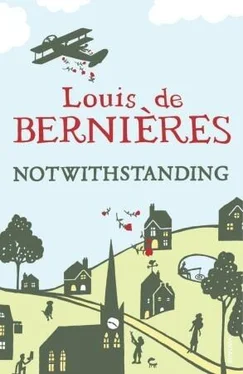Louis de Bernieres - Notwithstanding - Stories from an English Village
Здесь есть возможность читать онлайн «Louis de Bernieres - Notwithstanding - Stories from an English Village» весь текст электронной книги совершенно бесплатно (целиком полную версию без сокращений). В некоторых случаях можно слушать аудио, скачать через торрент в формате fb2 и присутствует краткое содержание. Год выпуска: 2010, Издательство: Vintage, Жанр: Современная проза, на английском языке. Описание произведения, (предисловие) а так же отзывы посетителей доступны на портале библиотеки ЛибКат.
- Название:Notwithstanding: Stories from an English Village
- Автор:
- Издательство:Vintage
- Жанр:
- Год:2010
- ISBN:нет данных
- Рейтинг книги:4 / 5. Голосов: 1
-
Избранное:Добавить в избранное
- Отзывы:
-
Ваша оценка:
- 80
- 1
- 2
- 3
- 4
- 5
Notwithstanding: Stories from an English Village: краткое содержание, описание и аннотация
Предлагаем к чтению аннотацию, описание, краткое содержание или предисловие (зависит от того, что написал сам автор книги «Notwithstanding: Stories from an English Village»). Если вы не нашли необходимую информацию о книге — напишите в комментариях, мы постараемся отыскать её.
is a funny and moving depiction of a charming vanished England.
Notwithstanding: Stories from an English Village — читать онлайн бесплатно полную книгу (весь текст) целиком
Ниже представлен текст книги, разбитый по страницам. Система сохранения места последней прочитанной страницы, позволяет с удобством читать онлайн бесплатно книгу «Notwithstanding: Stories from an English Village», без необходимости каждый раз заново искать на чём Вы остановились. Поставьте закладку, и сможете в любой момент перейти на страницу, на которой закончили чтение.
Интервал:
Закладка:
But Miss Feakes is not yet dead, and she conducts her day exactly as if she will live for ever. She sits in her armchair, and, one by one, she defleas her cats. They sit expectantly, according to the daily ritual, and they jump, purring, into her lap. She combs the fleas from their necks, stroking against the lie of the fur, and then she does their flanks and haunches. She fluffs up the fur of the long-haired ones, and gives them whimsical hairstyles which she then pats flat again, so as not to compromise their dignity. When she does their bellies, they go wild-eyed and silly, and sometimes they embrace her wrists with their front paws, biting at her fingers from sheer pleasure. Miss Feakes extracts the fleas from between the tines of the comb and drops them into a cereal bowl that is full of scalding water. They struggle a little, and die. She likes to poke at them with a forefinger, so that they sink to the bottom and drown more quickly. Miss Feakes keeps all the fur from her combings, and puts it in carrier bags, because one day she is intending to have it spun, and then she can knit herself the softest and most personal cardigan in the history of the world. Sometimes she thinks that it might make more sense simply to use it for stuffing cushions, but really it wouldn’t be the same.
When she has finished with the cats, Miss Feakes decides to go shopping. She has the same car that she has had since before the war. It is a grey 1927 Swift four-seat open tourer, with black mudguards and running boards, and a high steering wheel. The car is lovingly maintained for free by the two teetotal brothers at the garage, but at present the hood is falling apart and she has contrived to lose the wooden dashboard, exposing all the wiring. Therefore she takes it out only when her animals have not forecast rain. With long pins she secures a hat that, like her car, was flamboyant in her youth, and heaves at the starter handle. She has been feeling a little weak and woozy recently, and between each effort she pauses for breath and leans on the car, one hand on the top of the radiator for support. After so much time with the one car she has the knack of starting it, though, and it knocks into life and settles down into a steady tick. The car has a crash gearbox, but Miss Feakes is a maestro in the art of the double declutch, and the gears grate only when she surprises it into first. At the end of her drive she honks the rubber bulb of the horn several times, so that people will know that she is coming, and she will not have to lose precious momentum by using the brakes or changing down. In the village there are forty-two reckless drivers. Forty-one of them are nuns from the convent on the hill, who have altogether too much faith in the protective power of the Blessed Virgin, and the other is Miss Agatha Feakes, who today is going to Scats Farm Shop in Godalming in order to buy worming tablets, feed for her goats and chickens, a blade for her bowsaw and a new pair of wellington boots. Miss Feakes cannot easily reach her feet any more, but she has toenails like chisels, which destroy the toes of one pair of wellington boots every six months. She reminds herself daily to ask the doctor to cut them for her, but when it comes to the crunch she prefers to forswear the indignity. It is bad enough that he unwraps and rewraps her bandages, inspecting her varicose veins that are always in danger of ulceration. Twenty years ago he suggested an operation, but she said, ‘And who is going to look after my animals? I have responsibilities, you know,’ and so he never suggested it again. Miss Feakes takes her creatures very seriously; she has agreed with the vet that he can purchase her house in advance of her death in return for free treatment during her lifetime.
Miss Feakes returns from Scats. She passes the hedging and ditching man, who is examining the rusty remains of a shovel that he lost there ten years before. Once home she unloads the sacks of feed herself, heaving them into the shed and depositing them among the tatty collection of rakes and forks and faghooks. Miss Feakes always leaves the door of the shed open in summer so that the same family of swallows can breed in the top left-hand corner, and today she goes up on tiptoe to see inside, because the chicks are chirping, but she feels a little dizzy and decides to go in for a cup of tea, well deserved. Outside the kitchen her ancient car creaks as it cools down, and one of her cats wrests the last warmth from the engine by perching on the bonnet.
Miss Feakes is fortified by her tea and digestives, and in the company of her Labradors goes out into the Hurst. She has established that if she collects one fallen branch every week, and saws it up, she will accrue enough logs to see her through the winter. She has no other source of heating and would not have been able to afford the fuel even if she had. The oaks and beeches are kind to her, and she seldom has to wander far, but she likes birch logs best because they split so well. Miss Feakes likes to watch the flames of her fire because sometimes one sees a turquoise flame of unearthly beauty, so one can even look forward to winter.
On the way to the Hurst she meets a neighbour. ‘Hello, Aggy, how are you?’ asks Joan, and Miss Feakes replies, ‘Orfy ell,’ because she had not expected to meet anyone and has not inserted her teeth. Her favourite qualifier is ‘awfully’ and so Joan knows that Agatha is awfully well. ‘Lovely day,’ says Joan, and Agatha agrees, ‘Orfy ice.’
Now Agatha is in the Hurst, the twigs breaking beneath her feet, and the pigeons calling. Her dogs put up an iridescent cock pheasant, who cries petulantly and whirrs away across the field. From the distance come the sounds of tennis, the hollow clonk of croquet balls. A boy called Peter is shooting a tin can with an air rifle, and the pellets zip as the can skips and clatters along a gravel path. Overhead the whoosh of a hot-air balloon from the club in Godalming sets her dogs barking, and Fred, the hippy-haired mechanic from Alfold Crossways, putters towards Hascombe in his home-made motorised hang-glider, which one day he will fly illegally to Ireland, where he will fall in love, never to return.
Miss Feakes finds a newly fallen limb of beech, but it is caught up in brambles, and she hacks at its twigs to disentangle it. She has a billhook that she uses for this, which she also uses to split kindling. In the 1960s she used to imagine that the kindling was Harold Wilson, who was an ‘awfully horrid little man’. In this village only one person votes Labour, and only one person votes Liberal. The Liberal is considered a madman, and the Labourite a potential traitor. He owns the pub, however, and therefore has to be endured. Miss Feakes has voted Conservative ever since 1945, out of gratitude and respect for Winston Churchill.
Miss Feakes huffs and puffs as she drags the limb home. The dogs prance and growl, darting at the other end of it with their jaws, tugging at it, indulging some heroic doggy fantasy comprehensible only to their own simple imagination. The wood scrapes and bounces on the stones of the track, and Miss Feakes feels an unaccustomed weariness. It is as if her legs are becoming churlish. ‘Come on, old girl,’ she thinks to herself. She believes that old people live longer if they make no concessions to age, and in any case she thinks of herself no differently now than when she was eighteen, and strong and striking.
At the gate Agatha hears the telephone ringing, drops the branch and runs for the back door. Without taking her muddy wellingtons off, she pushes the door open, darts into the kitchen to fetch her teeth and dashes into the hall. Agatha is terribly excited, because nobody telephones her in the normal run of things. She is pleased that somebody wants to talk with her, she wonders who it is, she feels her heart jump with anticipation, and then she realises that the telephone wasn’t ringing. ‘Oh fire and fiddlesticks,’ she says, ‘it’s that bird again,’ for there is a starling in the village that has learned to imitate the telephone, and it flies from oak to oak along with its flock, causing young girls to think that at last he’s phoned, causing widows to think that a child has called, causing the Rector to dread that it might be the rural Dean.
Читать дальшеИнтервал:
Закладка:
Похожие книги на «Notwithstanding: Stories from an English Village»
Представляем Вашему вниманию похожие книги на «Notwithstanding: Stories from an English Village» списком для выбора. Мы отобрали схожую по названию и смыслу литературу в надежде предоставить читателям больше вариантов отыскать новые, интересные, ещё непрочитанные произведения.
Обсуждение, отзывы о книге «Notwithstanding: Stories from an English Village» и просто собственные мнения читателей. Оставьте ваши комментарии, напишите, что Вы думаете о произведении, его смысле или главных героях. Укажите что конкретно понравилось, а что нет, и почему Вы так считаете.












